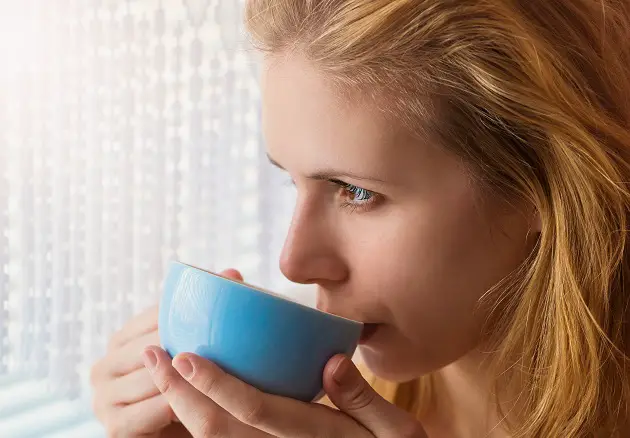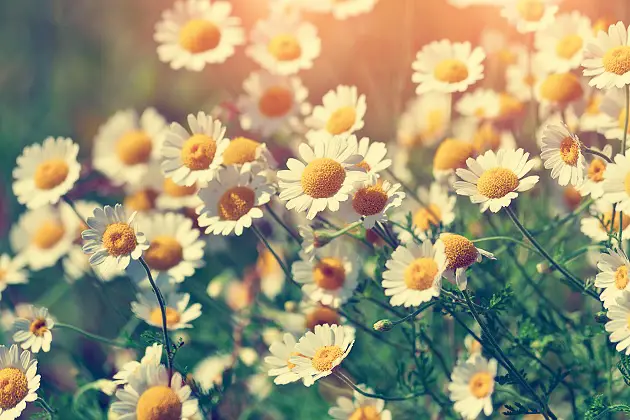Whether you are looking to improve your overall health or supplement your current diet, it is always important to understand the ingredients of what you are putting into your body.
Chamomile tea has long stood as a healthy drink, but if your diet restricts how much caffeine you can consume, then is this tea really the best choice?
This short article will go into detail on Chamomile tea, its health benefits, and its caffeine content.
Quick facts
- it has been enjoyed since ancient times
- it is a non-caffeinated & popular beverage
- packed with nutritious terpenoids and flavonoids
- calorie, sugar, and fat free
What is chamomile tea?
Chamomile tea is an herbal tea made of, you guessed it, chamomile!
There are two main types of chamomile that are often used but are two very different plants: German chamomile or Roman chamomile.
German chamomile is an annual plant, meaning it will die in the winter, that can grow up to three feet in height while Roman chamomile is a perennial plant, meaning it will come back each year, that is more of a ground cover herb.(1)
Chamomile as a culinary or medicinal herb has been used for thousands of years to help reduce inflammation.
From Ancient Egypt, Greece, and China to now, chamomile has long been a trusted health boost and cure all in many cultures. For this reason, chamomile has continued to boast a rather impressive reputation that makes it a powerful herbal remedy.
Chamomile is a powerful antibacterial herb with certain sedative properties.(1)
In a tea, people generally drink chamomile to help them sleep or to treat certain health conditions, such as anxiety, insomnia, and digestive issues.
Chamomile has also been known to treat different types of rheumatism as well as rashes.
In some cases, chamomile tea has even been known to help promote labor in pregnant women.(2) But in general, a warm cup of chamomile tea is the perfect remedy for an unsettled stomach or as a remedy to a stressful day.
Does it contain caffeine?

No, chamomile tea does not have any caffeine.
Indeed, chamomile is known as one of the best herbs to help stimulate restful sleep.(3) Which is great news if you are in need of a soothing, healthy herbal tea that can help you get your overall health and sleep routine back on track.
Most herbal teas are generally caffeine free, with the exception of green and black teas.
But teas that are made from flowering herbs have a lower chance of containing caffeine and are generally prized for their health benefits.
However, this being said, you should always check the ingredients label and nutrition facts label on any tea that you are looking to purchase.
Chamomile by itself has no caffeine, but that does not mean that certain tea manufacturers and merchants do not sometimes add other ingredients to their teas that could have caffeine.
Chamomile nutrition facts
In one cup of brewed chamomile tea, your body receives the following nutrients:(4)
- Carbohydrates: 0.47 g
- Energy: 2.37 kcal
- Calcium: 4.74 mg
- Iron: 0.19 mg
- Magnesium: 2.37 mg
- Potassium: 21.33 mg
- Sodium: 2.37 mg
- Zinc: 0.09 mg
- Copper: 0.04 mg
- Manganese: 0.1 mg
- Vitamin A: 47.4 IU
- Carotene beta: 28.44 mcg
- Thiamin: 0.02 mg
- Riboflavin: 0.01 mg
- Pantothenic acid: 0.03 mg
- Folate: 2.37 mcg
- Total polyunsaturated fatty acids: 0.01 g
Best of all, chamomile is completely calorie, sugar, and fat free, so drinking a cup or two will not adversely affect your diet or overall exercise routine.
Indeed, drinking a cup can help improve how your body feels overall, which, in turn, can help improve your mood and make exercise and dieting a little less of a struggle.
The benefits of chamomile

In addition to its pleasant, floral taste and anti-inflammatory properties, chamomile can also offer a number of other health benefits:(5)
- Immune system health
- Ability to soothe sore throats and decrease throat hoarseness
- Ability to calm anxiety and reduce stress
- Ease digestive issues and stomach pains
- Ease joint and muscle pains including menstrual cramps
- Soothe asthma complications
Chamomile can be used as a topical herbal supplement, but it is most common as a tea.
This special herb can be used for a number of different health related issues and as a preventative to those various issues. This health boost is possible because most herbal teas have a chemical component known as polyphenols in them which are powerful antioxidants.(6)
In the human body, an overflow of oxidants can lead to certain health complications (such as cardiovascular diseases).
Antioxidants, true to their name, help break down these more harmful chemicals which keeps the body functioning normally.
For stomach issues, a tea blend with chamomile or a pure chamomile tea can help either soothe an upset stomach, improve digestion overall, or even help ease painful and embarrassing gas.
Chamomile tea is also safe for use in children and can be used to treat colic or diarrhea, among other common childhood digestive issues.
Does chamomile have any side effects?
The primary side effect that an individual might experience while drinking chamomile is an allergic reaction.
However, this is, of course, assuming that the said individual is allergic to chamomile.
If you are not sure whether or not you are allergic to chamomile but you have rather severe allergies to other flowers and flowering plants, it is a good idea to avoid chamomile and other herbal teas, though you can consider trying chamomile or another herbal tea under the supervision of a trained medical professional.
There are some new studies out that are looking at the effects of herbal teas on dental health, which claim that many herbal teas can actually increase one’s propensity for tooth decay and enamel erosion.(7)
That being said, chamomile was singled out as one of the few herbal teas that does not fall into this category.
But again, you should always keep a close eye on the ingredients of your tea, as this only applies to pure chamomile tea.
Conclusion
Overall, chamomile is a healthy herbal tea that has no caffeine and can help with a number of different health issues.
This powerhouse herb is known as a sort of cure all for many different kinds of sicknesses that center on inflammation, digestive health, insomnia, or anxiety.
In other words, chamomile is not only safe and healthy, but it can actually help you sleep and feel better (which is also largely due to its lack of caffeine).
To help you take control of your health and feel better, you can take the following steps:
- Go to your local grocery or natural foods store
- Pick up some dried chamomile leaves (if you have a tea leaf strainer) or a box of prepackaged chamomile tea sachets
- Bring a pot or teapot of fresh water to a soft boil
- Carefully pour 1 cup of hot water over a tea bag (or equivalent loose leaf tea) and let sit 4 to 6 minutes
- Snuggle up in your favorite comfortable house clothes and/or blanket
- Sip carefully, and enjoy!
Resources
(1)http://heritagegarden.uic.edu/german-chamomile-matricaria-recutita/
(2)http://www.herbalsafety.utep.edu/herbal-fact-sheets/chamomile/
(3)https://portal.nysid.edu/ICS/icsfs/nsr6.html?target=6b13cca5-2e18-41b7-af86-01e5137b346b
(4)https://www.urmc.rochester.edu/encyclopedia/content.aspx?contenttypeid=76&contentid=14545-3
(5)https://u.osu.edu/engr2367pwww/top-herbal-remedies/chamomile/
(6)https://www.health.harvard.edu/staying-healthy/tea-a-cup-of-good-health
(7)http://www.nutritionatc.hawaii.edu/HO/2003/205.htm
Leave Feedback: Was this article helpful?

